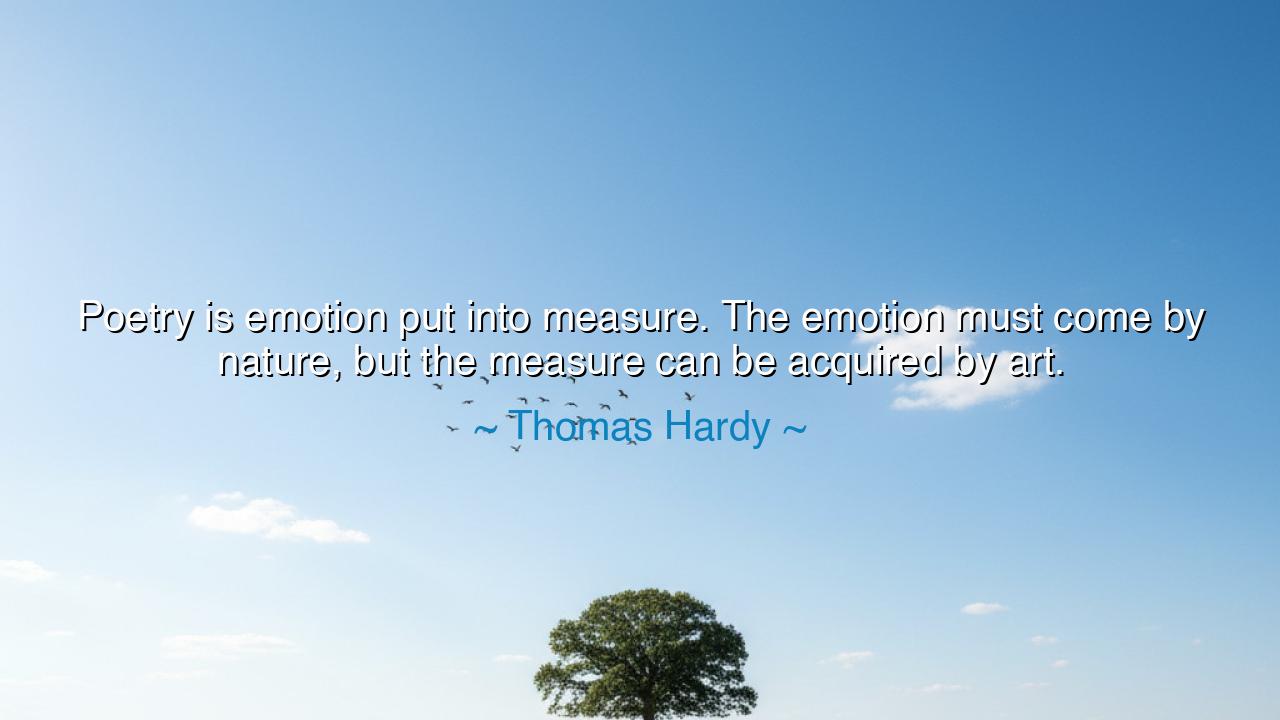
Poetry is emotion put into measure. The emotion must come by
Poetry is emotion put into measure. The emotion must come by nature, but the measure can be acquired by art.






Thomas Hardy, master of word and vision, once spoke with clarity that pierces the ages: “Poetry is emotion put into measure. The emotion must come by nature, but the measure can be acquired by art.” In this reflection, Hardy unveils the secret of all true creation — that art is born in the union of fire and form, of unrestrained feeling and disciplined craft. For without emotion, poetry is lifeless; but without measure, it is chaos. It is in the blending of the two that beauty arises, enduring and powerful.
The meaning of these words is that poetry, and by extension all art, is not merely an outpouring of passion, nor simply the product of technique. It is the marriage of the two. Emotion, Hardy declares, must be natural, flowing from the depths of human experience, unforced and sincere. Yet sincerity alone is not enough; raw feeling must be shaped, refined, and measured by art. The rhythm, the structure, the craft of language — these are the tools that turn fleeting passion into a creation that can endure across generations.
The origin of this truth lies in the very history of poetry itself. The ancient Greeks, who gave us Homer and Pindar, wove their epics not only from the fire of inspiration but from the careful cadence of meter and form. The bards of old sang with passion, but they also honored structure, knowing that the human heart responds not only to intensity, but to rhythm — to words set in order, echoing the patterns of music and the pulse of life itself. Hardy, standing in their lineage, reminds us that poetry is not only born but forged.
History shows us this union of passion and craft in countless examples. Consider Shakespeare, whose works overflow with raw human emotion — love, jealousy, grief, ambition — yet are held together by the steady rhythm of iambic pentameter. It is the measure that gives wings to the feeling, transforming passing emotion into words that have lived for centuries. Or recall Emily Dickinson, whose brief, sharp verses carried searing emotion, but whose artful compression and rhythm turned personal anguish into immortal song. In both, Hardy’s truth is alive: art tempers nature, and nature breathes fire into art.
Hardy’s words also serve as a caution. For many are tempted to believe that passion alone makes a poet, that raw outpourings of emotion are enough. Yet without discipline and measure, such efforts often dissolve into noise. Likewise, some master technique but lack true emotion; their work is polished but hollow, like a statue without spirit. Hardy teaches us that it is in the balance of both — the nature of feeling and the art of shaping — that the greatest poetry is born.
The lesson for future generations is profound: cultivate both heart and hand. Do not stifle your emotions, for they are the wellspring of creation, but also do not despise the labor of learning form, rhythm, and technique. For just as the river must flow freely yet be guided by its banks, so too must the poet’s passion flow within the structure of art. To master this harmony is to give voice to the eternal.
Practical actions arise from this teaching. Read deeply, to awaken your emotions; study widely, to refine your craft. Practice rhythm, form, and structure, not as prisons, but as vessels to carry the fire of your soul. Let your writing be both natural and measured, both spontaneous and disciplined. And above all, be sincere in your emotions, for no measure can redeem words that are false.
Thus, Hardy’s words endure as a timeless reminder: poetry is emotion shaped by art. It is the song of the heart refined into form, the fire of feeling carried by the vessel of craft. To honor both is to stand in the great tradition of poets who gave the world not fleeting cries, but enduring treasures of the human soul. Let this wisdom guide all who seek to create — that their words may not vanish like smoke, but endure like carved stone, alive with both fire and form.






AAdministratorAdministrator
Welcome, honored guests. Please leave a comment, we will respond soon